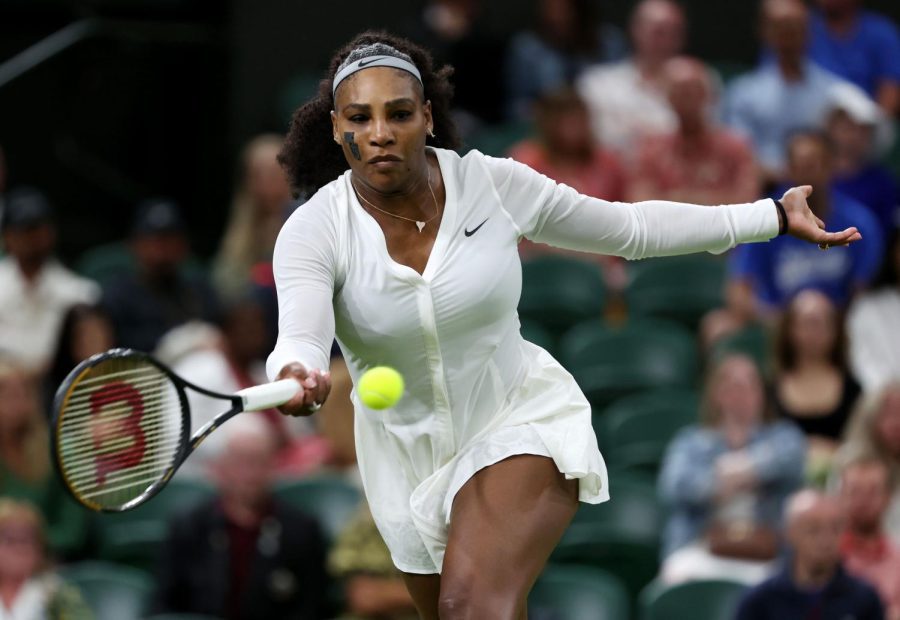Opinion | Tennis demands physical, mental greatness
Photo courtesy of Clive Brunskill/Getty Images/TNS
Serena Williams plays against France’s Harmony Tan during their first-round Wimbledon match on June 28. Assistant Opinions Editor Talia Duffy argues that tennis is one of the most physically and mentally demanding sports.
Aug 27, 2022
In the world of athletics, there’s a heated debate over which sport is the most difficult. It often ends with everyone vehemently defending the sport they played in high school, partially to protect their egos and partially because they lack a deep enough understanding of other sports to form a complete opinion.
I’m certainly guilty of this myself. Besides a few stints at soccer and softball as a child, I’ve truly dedicated myself to only one sport. So I can’t really say which sport is the best; I’m not qualified to have that opinion. I can only tell you what I know.
And what I know is tennis. I’ve played the sport for eight years, including three years at the varsity level in high school. I still play for fun with my friends today. Over all that time and practice, I learned there is more to tennis than most people realize; it is a fierce combination of both physical and cognitive skill.
There’s a misconception that tennis is not physically demanding. While it may not require as much brute strength as football or as much muscle endurance as swimming, tennis is not easy; its physical aspects are simply less conventional than other sports.
Tennis players develop abnormally strong forearms and calves from the motion of gameplay: gripping and swinging a racket, racing from one end of the court to the other, while staying on their toes. Multi-hour, multi-set matches build impressive aerobic and anaerobic endurance, especially for singles players. And keep in mind the amount of effort required for recreational rallies is far less than the amount required at the competitive level.
Get The Daily Illini in your inbox!
However, the true — and most unrecognized — challenge of tennis is mental. No other sport is quite so strategy based. Players have to constantly deduce where to stand, how to hit the ball, where to land their shot and more — all while trying to predict how their opponent will make those same decisions.
There are several different types of strokes and serves, each with its own unique purpose. Any nuanced tilt of a racket or unexpected gust of wind can make the difference between winning and losing. All players hit with their own unique style, forcing their opponent to adapt accordingly.
For new players, strategy is often the most difficult aspect of tennis to master. But seasoned players, too, are constantly chasing improvement. Unlike other sports, getting better at tennis isn’t about getting faster or stronger. There’s no record to set, no milestone to cross. Instead, it’s about gaining a subtle edge over your opponent, learning to outsmart them and determining how to make them falter.
The trick to winning is not to be the one that falters first.
Because so much of tennis relies on quick, calculated decisions, losing your cool usually means losing the match, too. Self-doubt can affect even the most skilled tennis players — almost as if it erases any technical advantage they might have had.
It’s a pattern any tennis player can recognize: they focus on one missed shot, think about what they should have done, overthink and skip the next few shots, concede the game, then fault their opening serve, then double fault, cascading down and down into a loss that feels worse than it should because they know they could have done better if they had just focused.
Getting out of this mindset is extremely difficult, especially once it starts. Mental resilience, self-confidence, and an in-the-moment perspective are more necessary in tennis than in any other sport.
Tennis players don’t have a team to back them up, to give them pep talks, to pick up the slack when they’re having an off day. Tennis players only have themselves to rely on. If tennis players break, they lose. And that’s the real challenge.
It’s hard to understand this concept without experiencing it, partially because everyone has a picture in their heads of recreational, low-stakes tennis at the country club. This kind of play definitely exists, but it does not represent the true depth and complexity of the sport.
Think, too, of Serena Williams, the epitome of an athlete in both physical and mental capacity. Think, too, of the high school teams that persist through hours of straight gameplay, because tennis matches can theoretically go on forever. Think, too, of the countless mangled rackets, smashed by players who couldn’t take the pressure.
And next time you get in a sports debate with your friends, don’t be so quick to take tennis out of the running.
Talia is a sophomore in Media.






